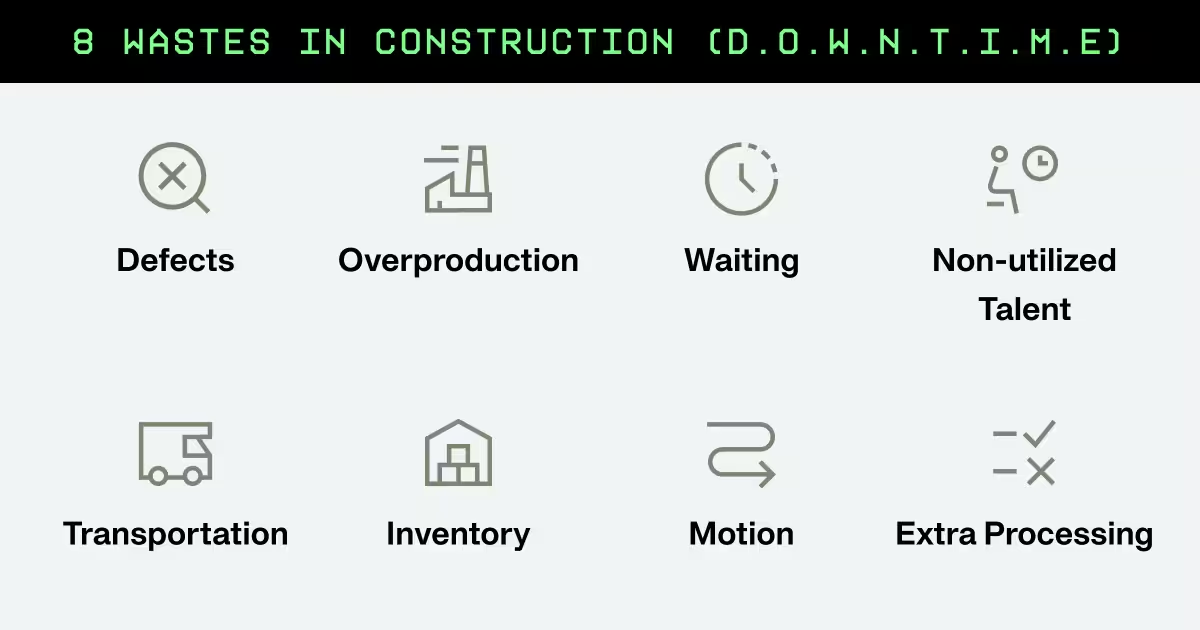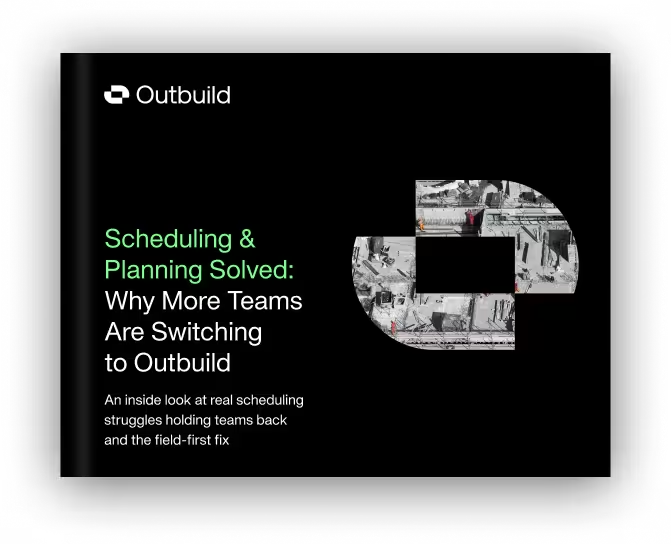Outbuild is online scheduling software to work together on connected project schedules and look-aheads, enabling everyone to move faster.
Key Takeaways
Table of Contents
- What is Rework in Construction?
- The Cost of Rework in Construction
- Causes of Rework in Construction
- How to Avoid Rework in Construction
Rework is one of the biggest headaches in the construction industry. Mistakes that cause work to be redone lead to project delays, budget strain, and overall inefficiency.
In short, rework is redoing work to meet quality, functionality or safety standards.
The impact of rework goes way beyond just fixing errors.
Rework in construction industry can happen for many reasons:
- Poor material quality
- Installation challenges
- Design issues
- Lack of communication
According to Navigant Construction Forum, rework accounts for 5-10% of a project’s total cost. The construction rework statistics don’t stop there. Rework can account for as much as 20% of total project time, according to the Construction Industry Institute.

Construction Rework includes both direct and indirect costs:
Direct Costs:
- material
- labor
- equipment
Indirect Costs:
- Delayed timelines
- reduced productivity
- unhappy stakeholders
- strained relationships
Knowing the root causes of rework in construction projects is the first step in the right direction. Here are a few examples of culprits causing rework in the industry:
Design Issues
Rework isn’t just something that happens on the jobsite — it’s often a sign that something went wrong with the design or early communication. When teams don’t share the same assumptions, handoffs are confusing, or documents are hard to find, it doesn’t just lead to change orders. It can also cause delays, lost trust between teams, and projects going over budget.
Poor Planning and Scheduling
Not having a detailed project plan leaves room for errors. Unrealistic timelines, skipping steps in the planning phase and pencil-whipped schedules all can lead to major rework.
Incomplete or inaccurate design documents often result in confusion and mistakes during construction. Collaboration and thorough reviews can help minimize these issues.
Poor Communication
Poor communication between project team members—contractors, architects, subcontractors—can lead to conflicting expectations, design errors or delays
Clear and consistent communication, like regular meetings and project management tools, helps everyone stay aligned.
Curious how to reduce rework in construction? Establishing a centralized platform for updates and document sharing can significantly reduce misunderstandings and streamline workflows.
Incorrect Installation
Errors because of incorrect measurements, rushed work or substandard materials often require extensive rework. Workers will install incorrectly if instructions are unclear or lacking in detail.
Ensuring that all team members have access to clear instructions is crucial for achieving accurate and efficient results.
Lack of Quality Control
Robust quality checks are essential especially in high pressure environments with multiple subcontractors.Implementing periodic inspections and involving experienced supervisors can help identify and address potential issues early.
This proactive approach not only improves overall outcomes but also fosters a culture of accountability and excellence.
Poor Material Selection
Choosing the wrong materials can derail timelines and force contractors to reorder inventory and redo work.
This can lead to increased costs and project delays, ultimately affecting client satisfaction. Prioritizing high-quality, durable materials from trusted suppliers can mitigate these risks and ensure long-term success.

Construction firms can be more strategic in their efforts to minimize rework. Here are a few tips:
Align on project scope
Before a team ever breaks ground, the project scope should be crystal clear. There should be no confusion of responsibilities, roles and timelines. Having a solid scope of work is key for aligning a construction team.
Ambiguous specs lead to different interpretations. Make sure your project documents are detailed and easy to understand. Clear drawings and specs reduce questions, RFIs, and costly assumptions.
Before the first slab is poured, the design needs to be rock solid. Walk through the plans with your team. Look for gaps, conflicts, or anything unclear.

Use Construction Scheduling and Planning Software
Hit the ground running with scheduling and planning software. Outbuild supports project teams through better alignment, early planning and real-time schedules.
A few features include:
- Lookahead Planning: Break down large tasks into smaller subtasks for better alignment.
- Roadblock Management: Identify and resolve potential obstacles before they impact the project timeline
- Simple Scheduling: Create clear, efficient schedules that keep all team members on track
- Resource Allocation: Optimize resources for maximum efficiency
How does Outbuild reduce rework in construction?
Outbuild is the only platform that lets users create schedules, lookaheads, and weekly work plans in one place. This integrated system offers a complete way to plan projects, which helps reduce rework
Here’s an example of how Outbuild reduced rework on a real project:
On a self-storage project, the superintendent used Outbuild’s roadblocks feature to flag an issue: the slab couldn’t be poured because the underground plumbing hadn’t been inspected yet.
Before Outbuild, people often found this issue too late. It would happen during the pour or just before. This caused last-minute delays and sometimes even leading to rework, like cutting into freshly poured concrete.
By logging the roadblock in Outbuild the team was able to track the plumbing inspection status, notify the responsible party, re-sequence work to keep the schedule moving without pouring over unapproved plumbing.
The Result? No rework. No wasted labor or material. Time and money saved.
Hear it from the field:
Invest in Tech for the Field
Empower your field team to stay on top of progress, issues and concerns in real-time to reduce rework in construction.
- Tools like Building Information Modeling (BIM) let teams see and resolve issues before they hit the field.
- Regular inspections to keep everyone aligned on progress and quality standards.
- Ensure clear documentation of completed work so all team members stay informed and avoid duplicating efforts.
- Use easy communication tools so field teams can report problems. Breaking down barriers between design, engineering, construction, and development teams helps everyone stay informed. To promote collaboration consider:
- Regular project meetings
- Centralized project management tools to share plans, progress reports and updates in real-time.
- Clear lines of responsibility so everyone knows their role and expectations.
Quality Assurance
Prioritize quality from the start and you can minimize defects and rework. Try:
- A detailed quality assurance checklist tailored to your project.
- Quality audits to identify and address issues early.
- Training sessions for staff to ensure they understand quality standards and expectations.
Implement Lean Construction Principles
Lean construction helps teams work smarter by eliminating waste and improving value. The result? Fewer delays, less rework, and better use of resources.
Focus only on what adds value. Cut out tasks, materials, and steps that don’t. Schedule materials and work for just-in-time delivery so that things happen at the right time—not too early or too late.

Thoughtful Construction Contracts
A 2021 study in Construction Management and Economics looks at how construction contracts can help reduce rework.
Current construction contracts often overlook specific clauses that could proactively address rework. Improving how contracts assess and allocate risk tied to rework causes could significantly enhance project outcomes.
By focusing on these areas, teams can improve productivity and reduce construction errors and rework.
Implementing solutions like Outbuild reduces construction errors and construction rework cost.
Ready to eliminate inefficiencies and improve communication?
If you are eager to remove the time consuming parts of your day while also reducing the risk of rework, then start your 14-day free trial or book a demo today.
Implement Lean Construction Principles
Lean construction helps teams work smarter by eliminating waste and improving value. The result? Fewer delays, less rework, and better use of resources.
Focus only on what adds value. Cut out tasks, materials, and steps that don’t. Schedule materials and work for just-in-time delivery so that things happen at the right time—not too early or too late.

Thoughtful Construction Contracts
A 2021 study in Construction Management and Economics looks at how construction contracts can help reduce rework.
Current construction contracts often overlook specific clauses that could proactively address rework. Improving how contracts assess and allocate risk tied to rework causes could significantly enhance project outcomes.
By focusing on these areas, teams can improve productivity and reduce construction errors and rework.
Implementing solutions like Outbuild reduces construction errors and construction rework cost.
Ready to eliminate inefficiencies and improve communication?
If you are eager to remove the time consuming parts of your day while also reducing the risk of rework, then start your 14-day free trial or book a demo today.
Frequently Asked Questions
Rework in construction is the process of correcting errors, mistakes or omissions made during a project. This can happen because of poor planning, bad communication, wrong installation, low quality control, or choosing the wrong materials.
According to Navigant Construction Forum, rework in construction is expensive, about 5-10% of total project cost. Construction rework statistics like this are eye opening. This includes direct costs like materials and labor and indirect costs like project delays and lost productivity.
The most common causes of rework in construction stem from poor planning and scheduling, which can lead to coordination issues and overlooked details. A lack of clear communication between teams—such as owners, designers, and contractors—also plays a major role, often resulting in misunderstandings or missed requirements. Rework can also occur due to improper installation techniques or failure to follow project specifications. When quality control measures are weak or inconsistent, errors can go unnoticed until it's too late. Lastly, using the wrong materials can cause performance issues or incompatibility, requiring the work to be redone.
Related Articles
Ready to see Outbuild?
Join hundreds of contractors from 10+ countries that are saving money by scheduling better









